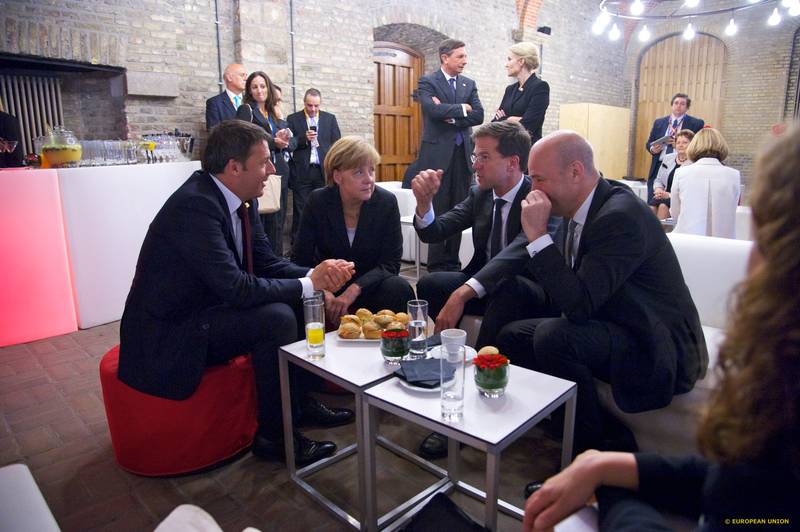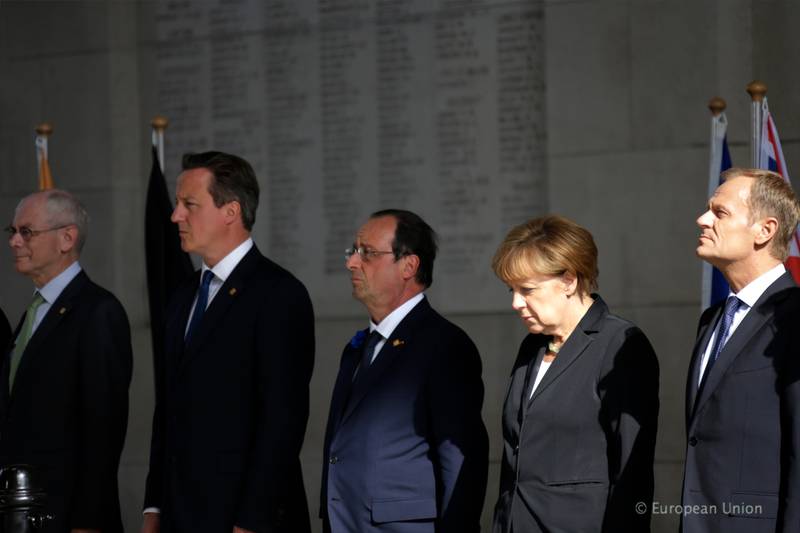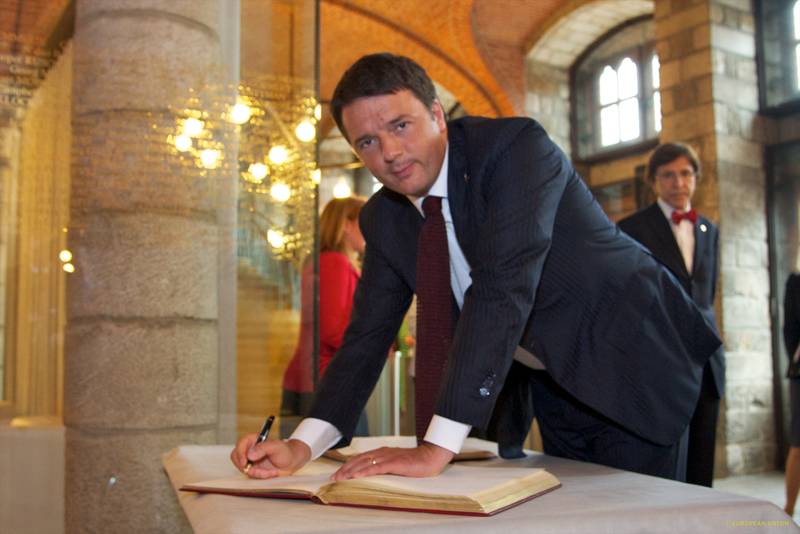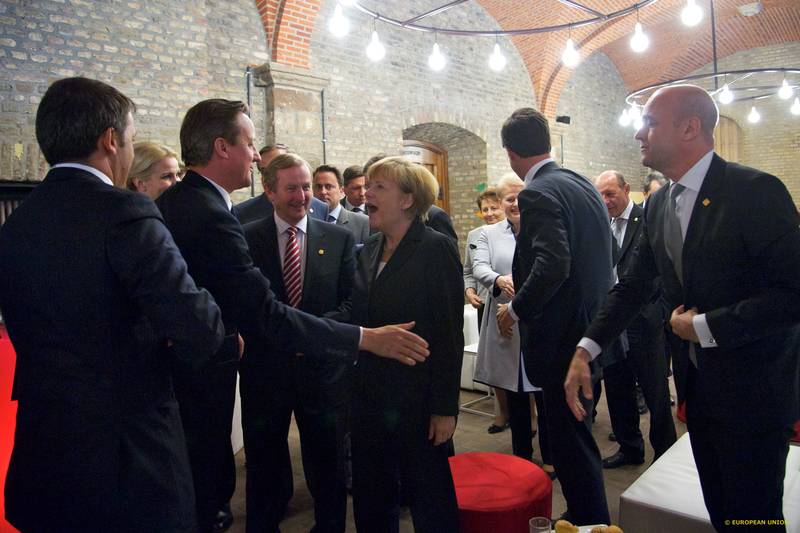EU in Rabbit Hole
Adelina Marini, June 27, 2014
 EU is slowly falling into the rabbit hole. However, the EU is not an Alice but 28 Alices led by various degrees of curiosity to see is it really possible a talking rabbit to exist with a coat and a watch or a European Commission chief who can be a reformer and innovator, a supporter of a looser union, to respect fiscal discipline but to be able to loosen the belt whenever some of the Alices feels its too tight. The big question after the falling is over, however, will not be whether on Friday (June 27) the EU will drink the syrup that will make it bigger or smaller, but whether it will drink the syrup that will make of the 28 Alices only one or no more than 2-3 - a Eurozone Alice, a British Alice and/or a Non-Euro Alice.
EU is slowly falling into the rabbit hole. However, the EU is not an Alice but 28 Alices led by various degrees of curiosity to see is it really possible a talking rabbit to exist with a coat and a watch or a European Commission chief who can be a reformer and innovator, a supporter of a looser union, to respect fiscal discipline but to be able to loosen the belt whenever some of the Alices feels its too tight. The big question after the falling is over, however, will not be whether on Friday (June 27) the EU will drink the syrup that will make it bigger or smaller, but whether it will drink the syrup that will make of the 28 Alices only one or no more than 2-3 - a Eurozone Alice, a British Alice and/or a Non-Euro Alice.
From the leaked in the public domain several strategic documents one can conclude that the Alices are not quite ambitious in their visions about the Union's future. This is odd against the backdrop of the floods of statements in the past weeks of the style "we need a new beginning", "we need radical reforms", "the Commission should be led by a reformer", etc. The documents that are at this stage accessible to euinside are 3. First is the EU strategic programme until 2020 which European Council President Herman Van Rompuy has worked on in his bilateral talks with the member states. The second is the vision of Italy Prime Minister Mateo Renzi in co-authorship with his undersecretary for EU affairs Sandro Gozi. And the third document are the draft conclusions for the June 27 summit. The three documents impress with too vague sentences and offer, practically, more of the same.
The Renzi-Gozi document is a little bit more specific which gives some ground to believe that more specific things and the essence are left to be agreed by the leaders on Friday. A very ambitious goal bearing in mind that on the agenda of the one-day summit there are other topics as well, like EU's climate targets by 2030, the European semester and the Union's enlargement.
Reforms of the EU? No, but of the euro area - yes
The new EU slogan should no longer be "united in diversity" but rather "together divided". Such a conclusion emerges after reading the three documents. In the EU strategic programme by 2020 are outlined five main guidelines for development: A Union of jobs, growth and competitiveness; A Union for all empowering its citizens; Toward an energy union; A Union of freedom, security and justice; A Union as a strong global player. The only new thing in the otherwise painfully familiar EU clichйs is guideline 3 - "Toward an Energy Union". According to the Brusselian lexicon, this should be interpreted as a serious letter of intention. This is precisely how the road map was named that Herman Van Rompuy drew together with the other three presidents - of the Commission, ECB and the Eurogroup - "Toward a Genuine Economic and Monetary Union". The purpose of the document was to outline the next steps of the deepening of the euro area integration.
Using the same rhetoric with regard to energy is a serious step forward, the merit for which holds Polish Prime Minster Donald Tusk who proposed first the establishment of an energy union. Naturally, it should be taken into account that this formulation does not at all mean that EU does indeed plan to establish such a union soon. The experience with the banking union suggests that leaders work best under strong pressure (in this case by the financial markets) but in the moment when their grip weakens they begin to postpone the strongly integrationist solutions that require treaty changes and a much stronger commitment among the member states. So, one of the big news that are expected from the summit on Friday in Brussels is how exactly will these guidelines be articulated. The draft conclusions show a very weak ambition.
It is written in them that the leaders underscore the importance of deepening the integration of the energy market, but they see this realised, at first, on a regional principle through construction of the lacking infrastructure, increasing interconnectivity in the framework of the already set target the common energy market to be completed by the end of this year. No word of an energy union. Matteo Renzi's vision does not envisage an energy union as well. He talks generally about the completion of the single energy market which is easy to explain with the strong energy relations between Italy and Russia.
One of the greatest expectations around the crisis after the European elections was that at the June summit will be discussed specific steps for reform of the European Union. But all the three documents that leaked in the public domain are very disappointing. The EU strategic programme until 2020 ends with the following conclusion: "To achieve these objectives [mentioned above], there is a need for efficient and legitimate European institutions. The complementary dual democratic legitimacy of the European Union through the directly elected European Parliament and the elected national governments in the Council needs to be respected. They ought to organise themselves accordingly. They have to work well together, in full respect of the Treaties and of their respective roles. Their work should be guided by the principles of subsidiarity and proportionality. A greater place should be given to national parliaments, including by strengthening their means of participating in the debate and making  their voice heard in the decision-making process".
their voice heard in the decision-making process".
This quite general and cautious conclusion reveals a trend that has been riping for some time that while integration in the euro area is deepening the gravitation forces at EU level are weakening. Evidence can be found in the draft conclusions and Matteo Renzi's document. The leaders are expected on June 27th to confirm their commitment to continue on the path toward "a genuine Economic and Monetary Union", especially with a focus on deepening the coordination of economic policies. In the draft conclusions it is written that the euro area member states commit to adopt economic policies that are mutually enhancing through a process of convergence and with the assistance of solidarity mechanisms. This task, however, will in the future, too, be performed by the future chief of the European Council in a "close cooperation with the future president of the Commission", the document says.
This is a very strong message aimed at Jose Manuel Barroso's successor who afforded himself an own initiative beyond the road map of the four presidents. This approach, too, reveals a desire whoever succeeds Barroso in his seat to rather follow the member states not the other way round, which, too, is in contrast to the stated desire the next European Commission president to be detached and innovator. Renzi's document, too, envisages deepening of the integration following Herman Van Rompuy's road map which is important given that Italy is taking over the rotating Council presidency on July 1st. The Italian prime minister believes that a strong focus should be put on building a fiscal capacity (eurozone budget) which could absorb external shocks. He proposes also the introduction of automatic stabilisers in the framework of the eurozone.
Encouraging in Mr Renzi's document is that it pays special attention on structural reforms. It is high time, he writes, the agreed reforms to materialise, especially against the backdrop of the absence of "supportive macroeconomic environment with buoyant aggregate demand". He also believes that incentives for reforms should be increased. In the past days, there was a lot of talk that Italy insisted on loosening the austerity policy as a precondition for support for Juncker as Commission president. However, it is hard to suggest that from his document. He, indeed, talks about more flexibility but he rather demonstrates openness for dialogue. It is said that the fiscal compact puts the need of fiscal discipline in the long-tern on constitutional level while the Stability and Growth Pact envisages some room for flexibility in the short term.
So far, the document reads, provisions are being interpreted in a restrictive manner and are mainly used to accommodate extreme recessions. If attention shifts rather on structural reforms and related investments this entails the need to assess whether any change is needed in the understanding regarding the implementation of such flexibility provisions. Moreover, more focus is needed on incentives in support of reforms, not on sanctions. This means that Matteo Renzi does not at all demand concessions, on the contrary. He rather wants if a country does implement the promised reforms to be awarded with more flexible criteria.
 Matteo Renzi also talks about funding of economic growth at EU level mostly in the area of digital economy, energy and telecommunications. He believes that more can be done to apply project bonds invented by Barroso's Commission and proposes the establishment of a European investment fund. The EU strategic programme recommends "adaptation" of the governance structures by ensuring openness and transparency. Coordination of economic policies needs to be enhanced, the document says.
Matteo Renzi also talks about funding of economic growth at EU level mostly in the area of digital economy, energy and telecommunications. He believes that more can be done to apply project bonds invented by Barroso's Commission and proposes the establishment of a European investment fund. The EU strategic programme recommends "adaptation" of the governance structures by ensuring openness and transparency. Coordination of economic policies needs to be enhanced, the document says.
Economy is not everything
Matteo Renzi's document is something more than a strategic document. There is an element of a political declaration in it. The Italian premier points out that there is nothing worse than entering into inter-institutional conflicts around the EU top jobs. This would be completely incomprehensible for the European public and would be irresponsible in the face of the challenges. That is why, Renzi proposes first to draw the priorities and only then to seek the most appropriate candidates for their implementation. It is also necessary to give "better sense" in the EU's institutional structure so that they are more oriented toward the needs of the citizens. This means to enhance efficiency and democratic legitimacy of the decision-making process in the EU.
Mr Renzi proposes holding a broad debate about the future of the European governance. He, too, supports the idea to create clusters of commissioners - each for every European priority - and believes that this idea should be given a very serious consideration. And the European priorities, according to him, are growth and employment; deepening of the euro area integration; external policy. He also believes it is necessary to change the European discourse. The European integration is not only finance and fiscal policy, says the Renzi-Gozi document. Focus should return again on human rights and the fundamental liberties by setting a new tone taking into account that these represent the foundation of the European construction.
This issue is mentioned in the other two documents as well. In the strategic programme of the EU, this is the fourth guideline for development of the EU, but there are no specific proposals in this direction. The draft conclusions, however, are much more detailed, but they mainly focus on internal and external migration. According to the document, the fight with irregular migration flows should turning into an essential part of the European migration policy. The problem is proposed to be resolved mainly through work with the countries that are sources of these flows. Regarding internal migration, in the draft conclusions there are no fundamental changes. Only "enhancing" is envisaged of already agreed provisions.
Matteo Renzi expects the next Commission chief to be a person who is capable to realise his priorities which are also priorities for the Italian presidency. The future Commission chief should be "the President of the Commission needs to be bold and inventive; determined to move things forward; ready to defend the Commission’s prerogatives but also to look the Heads of State into the eyes. He has to nurture an increased capacity to interact with national political systems and Parliaments; demand compliance with the EU rules but also be able to think out of the box; be inventive, and explore new paths, taking the long view about the EU policies’ impact. In other word, the next President of the European Commission must be a catalyst for change", Renzi's document says.
Does Jean-Claude Juncker fit into this description is a question the answer to which will be sought by the leaders during their summit. The bigger problem, though, is that the more concrete the job description is the more vague the ideas for the future are. Slovenia President Borut Pahor, who represented Slovenia at the commemoration of the centennial anniversary of the start of WWI in the Belgian town of Ypres and who took part in the formal dinner afterwards, said that Herman Van Rompuy's strategic programme is not at all ambitious. It does not foresee any institutional reforms that are the right answer to the problems that emerged during the crisis. Borut Pahor is one of the heads of state in the EU who defend more Europe. His vision seems unchanged since his speech in the European Parliament last year.
Croatia's Prime Minister Zoran Milanovic, however, is of the opinion that there is enough Europe. In an interview he recently said that he is against someone telling the member states how much should retirement age be, which puts the Croatian leader in the group pf eurosceptics.
EU in the mirror land
And while the leaders of the member states are searching for the most ambitious candidate for their disappointingly unambitious programme, in the European Parliament the political groups are drawing a very different picture. Recently, the programme for the next five years of the biggest group in parliament - EPP - has been published, which contains not simply ideas, but literally demands. The group continues to believe that fiscal discipline is a responsibility for the future. They expect the new Commission to deliver specific proposals for progress of the construction of the digital market, common rules for data protection and protection of intellectual property, to propose a strategy for Internet security. The Eurogroup should have a permanent president and that should be the monetary affairs commissioner.  He or she should have the power to oversee national budgets in the framework of the European semester.
He or she should have the power to oversee national budgets in the framework of the European semester.
The EPP group does not want the EU to be divided into a euro area and the rest which is why the group believes that any future changes should be done on the basis of the existing community institutions. The group does not talk about an energy union but believes that the common energy market should include collective bargaining of the prices with third country suppliers. A new post must be created in the Commission - a commissioner of subsidiarity - who should oversee whether the principle of subsidiarity is respected (what can be done at national level not to be done at EU level and vice versa). It is very important for the EPP group to ensure media pluralism and transparency of media ownership. Political influence over media should be restricted.
The MEPs from this group fully support the enlargement process but are of the opinion that in the next five years new preconditions should be developed specifically for the Western Balkan countries, as this website also called for. They call for a broad discussion regarding the geographic and political borders of the EU.
The Socialists and Democrats in the European Parliament have only one demand for the future Commission chief and that is to conduct policies that will ensure jobs and economic growth. The fact that Guy Verhofstadt was elected to lead again the group of Liberals suggests that the group will stick to the programme he tried to win the elections with as a Spitzenkandidat. Unlike them, the already third biggest force in the European Parliament - the group of European Conservatives and Reformists - are for a looser union, stricter control on the use of EU funds, removing of red tape for small and medium-sized businesses; implementation of the European semester; development of digital economy.
Whatever the leaders decide these days, they should know that when they go out of the rabbit hole the world might again have changed.
 Federica Mogherini | © Council of the EU
Federica Mogherini | © Council of the EU | © Council of the EU
| © Council of the EU Luis De Guindos | © Council of the EU
Luis De Guindos | © Council of the EU